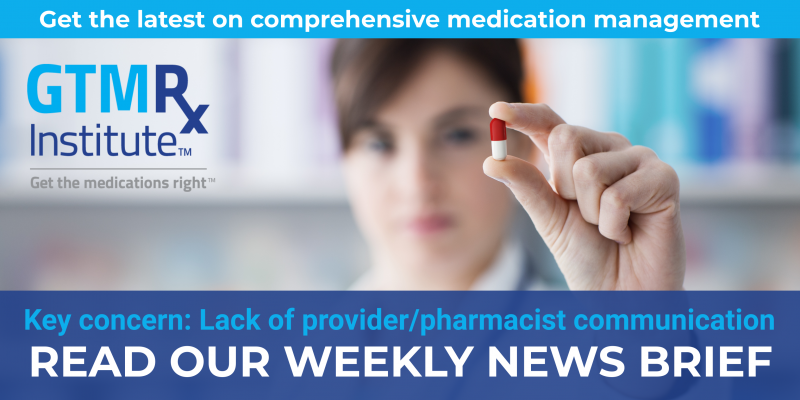Practice Transformation
In terms of managing medications, what’s the biggest issue? Surprisingly, it’s not cost. In a GTMRx survey of health care leaders, 50.3% of respondents chose lack of communication between prescribers and pharmacists. Medication costs came in second (36%). The survey found almost unanimous (96%) agreement about the need for a more comprehensive and integrated way to manage medications. However, 44% said that comprehensive medication management is not well understood or not understood at all in their immediate network. (GTMRx Institute)
Breast cancer survivors face different burdens of symptoms after treatment ends. As a result, there is an unmet need for tailored approaches to follow-up care, according to a study presented at the European Society for Medical Oncology Breast Cancer 2021 Virtual Congress. As breast cancer becomes a largely curable disease, the quality of life after cancer has become increasingly important. But current standards of follow-up may inadequately address it. The study findings confirm the need for personalized approaches to follow-up care for cancer survivors (Pharmacy Times; ESMO announcement)
Evidence & Innovation
It’s fine to give the coronavirus vaccine alongside other vaccinations, according to the CDC. This is important, given that many children and teenagers are behind on their regular inoculations. The American Academy of Pediatrics also announced its support for giving routine childhood vaccines together with coronavirus vaccines. Previous advice was to avoid giving coronavirus vaccine within two weeks of any other vaccine. But that advice has now changed, based on safety data. (CNN)
Nearly 20% of adults with hypertension take medications that could be elevating their blood pressure, according to new research presented at the American College of Cardiology’s 70th Annual Scientific Session. The three most common classes of medications were antidepressants, NSAIDs and oral steroids used to treat conditions such as gout, lupus, rheumatoid arthritis or after an organ transplant. These medications were reported by 9%, 7% and 2% of participants, respectively. Other medications associated with blood pressure elevation include certain antipsychotics, oral contraceptives and decongestants. (Cardiovascular Business; ACC announcement)
Policy Solutions
Passing a bill to bring down prescription drug costs should be lawmakers’ top priority, according to half of the registered voters responding to a survey by Morning Consult and Politico. Specifically, 85% of respondents said lawmakers should prioritize passing a bill to bring down prescription drug costs, with 50% saying it should be a top priority. (Becker’s Hospital Review; The Hill)
Medicare beneficiaries frequently receive low-value preventive services, costing over $477 million each year, according to research published in the Journal of General Internal Medicine. The services, which received a “D” rating from the US Preventive Services Task Force, lack clear health benefits and may even cause harm. In a related development, the Lown Institute has released the names of the worst 50 and best 50 hospitals ranked by how frequently patients had any 12 procedures largely regarded as unnecessary. (MedPage Today*; Journal of General Internal Medicine)
Note: sources that have an asterisk require login to view the article.
In Case You Missed It!
Join us for a webinar to hear from two leading experts on ways to implement a buy-right strategy when working with medical carriers, PBMs, etc., and in structuring benefit plan design on the medical and pharmacy side as you pursue value-based care.
Find more information here.
Register here.
This roundtable will be focused on payment, policy and practice reform to support optimized medication use. The event will be held on June 23, 2021 from 2 – 5 pm ET. Speakers to be announced soon.
Interested in sponsorship or attending? Contact Jeff Hanson (e: [email protected]).
Our Employer toolkit, developed by the GTMRx Employer Toolkit Taskforce, explores the benefits of CMM for individuals and for the employers who pay for benefits.
Covers topics, such as:
- What is CMM
- How CMM differs from traditional MTM
- The ROI of CMM in practice
- Patients that benefit the most from CMM services
- CMM & value-based strategies (return-on-investment)
- CMM & Pharmacogenomics testing
- Employer call to action
Find more information on its development and what others are saying in our press release. Find other, employer-related resources.
Download the Employer Toolkit today!
Employers want a healthy, productive workforce. They want to eliminate waste. They want health care that works. They want the investments they make in primary care programs designed to manage chronic conditions and in medication management programs to create value; mitigate risks; and decrease hospitalizations, ER visits and other services that impact total cost of care.
They can make that happen. Read more.
AmazonSmile is an easy way for 0.5% of your qualified purchases go to the GTMRx Foundation at no cost to you. And signing up is simple—go to smile.amazon.com and select “Get the Medications Right Foundation” as your charity of choice. If you prefer to directly donate instead, you can do so here.
Adding the foundation on AmazonSmile will help us continue to provide no cost educational webinars, issue briefs, weekly news briefs and promote the need for transformation of our current system of medication use through social media campaigns.




